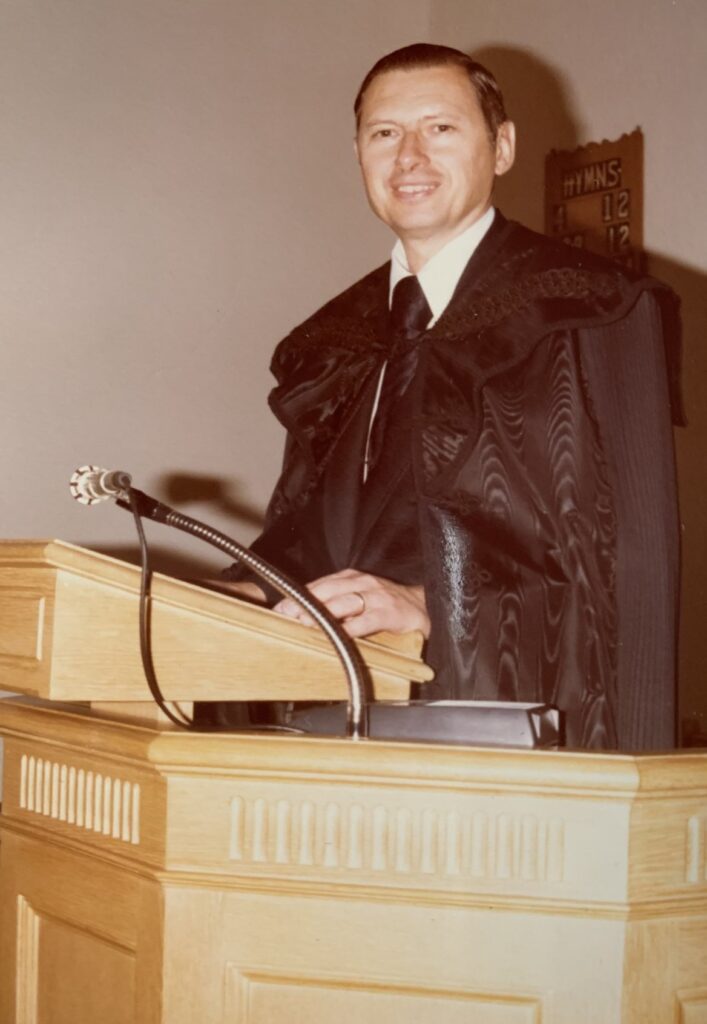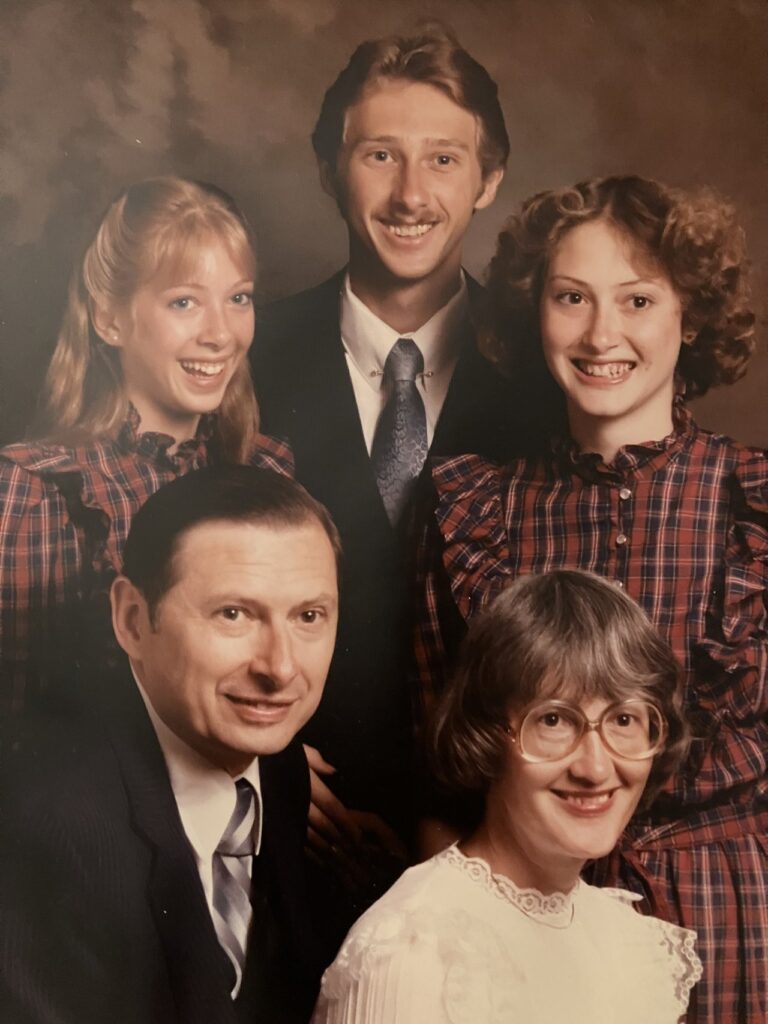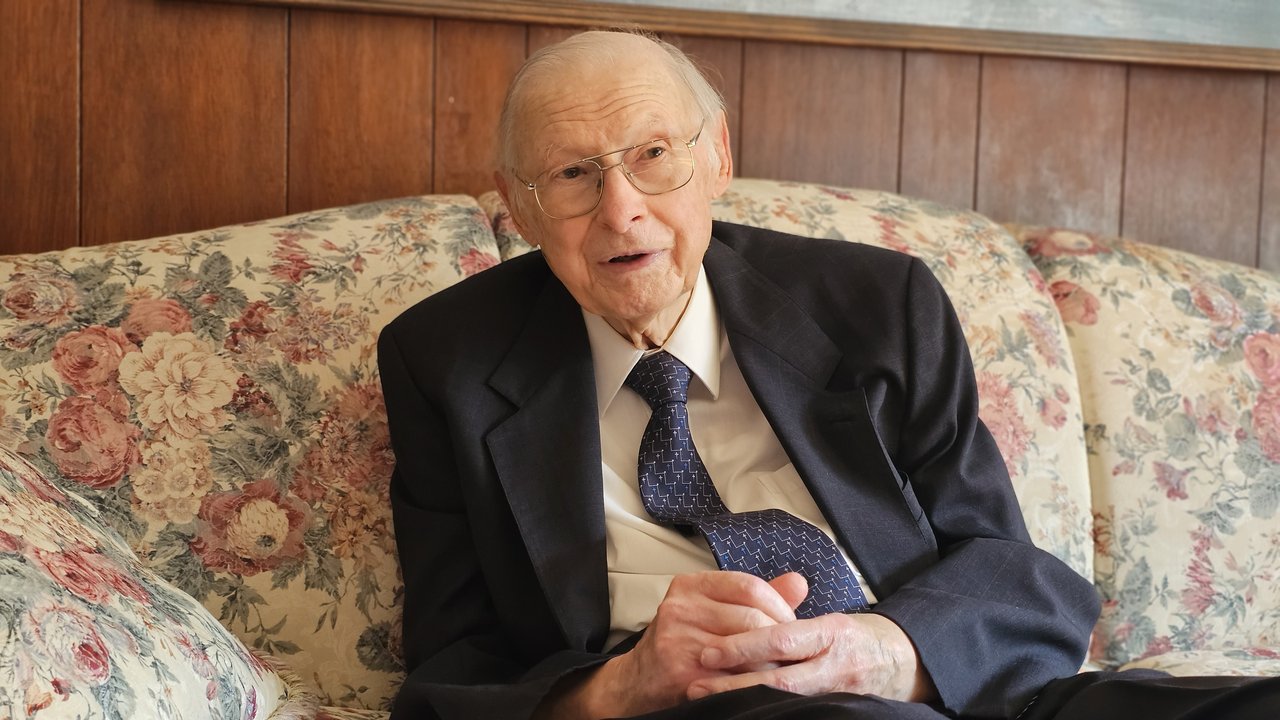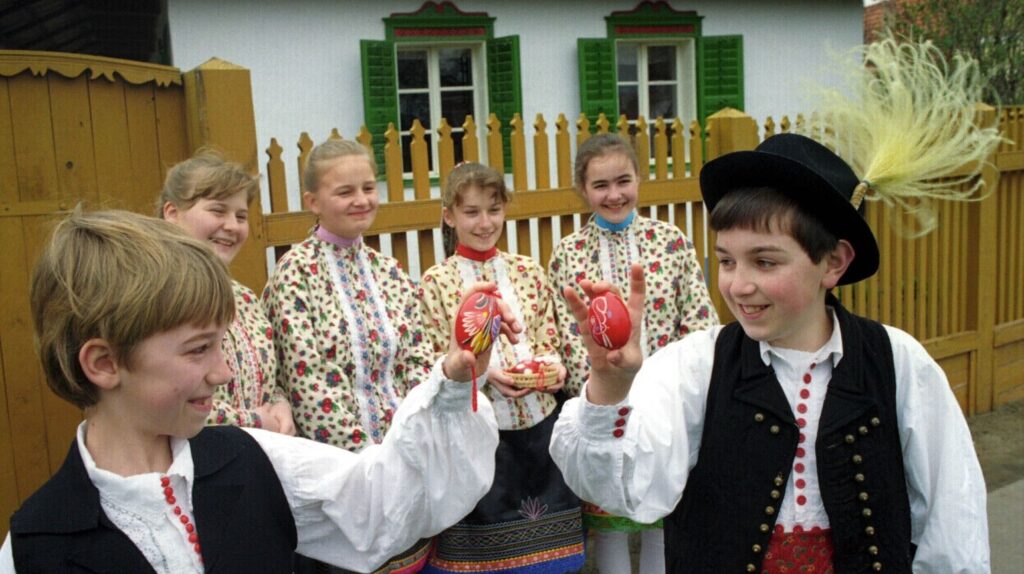This is an abridged version of the original interview, published online on reformatus.hu on 10 February 2024.
Ferenc Endrei took a long and adventurous path to America and his calling. During the war, at the age of 13, he discovered the Bible. Although he first became an engineer, his university hosts and the influence of Billy Graham led him to his true vocation. He served as the pastor of the Cleveland Reformed Church for 28 years, during its most challenging times. Well into his 90s, he recalled details of his long life with extraordinary memory while talking in his home in Cleveland, Ohio.
***
Why did you become a pastor, and how did you end up in America?
I was born in Kaposvár, Hungary in 1931. My father was a military doctor, and in 1944, he was transferred to Nagykanizsa from the front. At that time, the Russians were approaching the town, so the entire hospital’s equipment and patients were loaded onto railway wagons, in what we called a ‘hospital train’. Initially, we were supposed to be received in the border town Szombathely, but in the end, the hospital was evacuated to Germany. After ten days of traveling by train, we arrived in a small town north of Nuremberg called Kronach, where we continued operating as a Hungarian military hospital, treating wounded Hungarians. My father appointed Csomasz Tóth Kálmán, a Reformed pastor and my mother’s brother-in-law, as the hospital chaplain. They lived with us in the schoolroom where we were first accommodated in Kronach, and we attended his sermons. Later, we were assigned an apartment, so we didn’t have to go to a refugee camp. I had also attended religious education classes in Hungary, but when American bombers were flying overhead, I began reading the Bible. It became crucial for me to find solid spiritual nourishment in the midst of uncertainty, far from home, in a foreign-language environment.
Did the Bible provide answers for a 13-year-old? Did you discuss what you read with anyone?
Yes, the Bible provided answers. It showed me that God not only exists but also cares for us. And that doesn’t depend on how strong someone is—everything depends on the Almighty God. I talked about these matters with my mother, and through her, I became a Bible reader. I read many parts of the Scriptures including those I hadn’t even known were in the Bible. However, I didn’t decide at that time to become a pastor; that happened later, in America, where I arrived at the age of 17 or 18. Our sponsors, who invited us as part of the immigration process, were our American relatives who had emigrated years earlier. Still, we had to wait four years in Germany before we could reach the United States.
When and how did you find your calling?
I started as a Lutheran because my father was Lutheran and I wasn’t yet ready to become a pastor. I studied engineering, first attending a Catholic university in Detroit for two years, then being transferred to the University of Michigan, where I earned my engineering degree. There I lived with a retired Reformed pastor and his wife, who rented out rooms in their house to students. They were true believers, especially the woman, who had the soul of a missionary. She took an interest in me, gave me an English Bible that I read while listening to Billy Graham on the radio. He emphasized that we must place our faith and trust in Jesus Christ. He taught that it’s a decision whether we give our lives to Him and trust in Him, or whether we merely use Him to fulfill our selfish goals in life. This, along with reading the Bible, had a great impact on me. At university, I read that we accept Jesus Christ as our Savior through faith and that He paid for our sins on the cross and thus suffered the punishment we deserved. We must accept that He redeemed us with His blood, and that salvation is given to us by grace, not because we earned it, but because Jesus Christ welcomes us by His grace.
‘I realized that my mission was right here—I didn’t need to go any farther’
Did the young man in his 20s listen to this teaching until he decided he would not be an engineer after all?
Yes. I finished my engineering studies in August, and by early September, I was already on a train heading to the Seminar. I only had three weeks off between earning my engineering degree and starting theology school. That lasted three years. Initially, I thought I’d go abroad as a missionary, perhaps to India—there is a need for missionaries all over the world. But after completing the school, I returned home to my parents’ house in Kalamazoo, Michigan. My parents attended the local Hungarian Reformed church, and I began attending as well. I saw how much these people needed spiritual life. They went to church out of habit and followed traditions, but they lacked true spiritual vitality. That’s when I became a Hungarian Reformed pastor. I realized that my mission was right here—I didn’t need to go any farther.
How and when did you come to Cleveland, and what did you experience here at the time?
I lived in Michigan for about three years, then moved to Gary, Indiana, near Chicago, Illinois, where the massive steel mills were located. At the time, there was a Hungarian congregation there that no longer exists today. We even built a church there. The previous one had burned down, so we constructed a beautiful little church. Unfortunately, that church is also gone now, as Hungarian churches have struggled to retain young people in their congregations. In 1968, I was invited to Cleveland to serve at the First Hungarian Presbyterian Church. On Buckeye Road, there was both a smaller Presbyterian and a large Reformed church, where Dr. István Szabó served as pastor for many years. Both churches were essentially Reformed, as the Presbyterians also follow Reformed theology. There was also a nearby Hungarian Lutheran church and two Hungarian Catholic churches. In the ‘60s, Buckeye Road was a vibrant Hungarian community, with Hungarian shops, restaurants, and an entire Hungarian colony.
How did the two Reformed congregations evolve in terms of numbers?
The churches were well-attended—many people attended the services, though some traveled by car from far away. I had never seen anything like it before. The larger Hungarian service attracted 150 people in the smaller church, and on major holidays, even 200. The larger church had even more attendees. For a while, both churches were able to sustain themselves, though it became increasingly difficult each year. Eventually, in 1988 the two Reformed churches merged and we melded into the larger church. By then, Dr. István Szabó was around 90 and had retired, though he lived until 102. His successor was Pastor István Szilágyi. We were good friends, and after many discussions and prayers, the leadership of both congregations agreed to unite. There was a transitional period of six months while we attended the larger church. When Szilágyi eventually stepped down to serve an English-speaking congregation, I became the pastor of the united church.

By then, the Hungarian population on Buckeye Road had dwindled significantly as crime was rising—not just on the streets but also in homes and businesses. Many people moved away and didn’t return to church, so the congregation in the large church also shrank. On major holidays, attendance was still over 100, but on regular Sundays it decreased to about 80. Eventually, the church itself relocated once there was a place to move into. In 1992 the first wing of a new building was constructed in the suburbs. Construction continued over the following years—first the church, then the hall—and I remained the pastor throughout this process. I retired in 1996.
You served 28 long years as a Pastor in Cleveland, with important changes and difficult decisions… How did you and the community cope with all this? How were you able to keep the congregation together?
That’s a very good question. We often asked ourselves how we could move forward and what the right way to do so was. There were always people who thought differently—not just about the construction projects but also regarding spiritual life. Some preferred to attend church primarily for social gatherings, such as luncheons and other events, which, of course, are good, and we were happy to welcome them, but if that was the only reason they came, they missed the essence of faith. This difference in priorities was one of the main sources of friction within the congregation. I always prioritized spiritual matters, but had to realize that not everyone was as interested in them. We held Bible study sessions in addition to Sunday services, where people could share their struggles, and we prayed together. While a church service follows a formal order—prayers, Bible readings, etc.—in the Bible studies in someone’s home, we could freely converse and pray for each other. Some members had serious doubts, even about their faith, but through these studies, they found answers by focusing on Scripture and emphasizing what the Bible teaches.

How challenging was growing bilingualism for you and the community?
There was always a slight difference between the first-generation Hungarian-speaking immigrants and their primarily English-speaking descendants, but it was never insurmountable. Language barriers can be an issue in any congregation, so they always need attention. In our case, thanks to Dr. István Szabó, the Hungarian and English-speaking members got along quite well. These were two distinct communities, and I was the pastor for both. I couldn’t merge them into one, but we always respected the fact that people wanted to hear the Word in the language they understood best.
Bilingualism was indeed a dividing factor, but the more significant differences were spiritual. Of course, financial issues also caused major disagreements. Despite these challenges, I believe many appreciated that we managed to save our church together and that God helped us through. To be honest, I retired feeling completely exhausted. Around that time, my son had started an earnest congregation with a charismatic influence on the west side of Cleveland. When I was nearing 65, I decided it was best to retire in peace, avoiding conflicts over different visions for the church.
Your son didn’t succeed you, right? Did you still stay involved with the church after retirement?
No, he didn’t. After I left, there was a rather turbulent period with many changes until the Krasznais arrived. We had actually met before, back in Hungary, around 2000, when they were still living there. At the time, there was a university faith group called the Timothy Society, where the Krasznais were active. We met at one of their conferences. Beáta, Csaba’s wife, led a Bible study for university students, which we also attended. At that time, there was no talk of them coming to America, I didn’t even know Csaba was applying here. When they arrived, however, we were very happy. We love them, and they are doing their work diligently and beautifully. I appreciate that they sought connections with other Hungarian congregations, not just Reformed ones, helping to maintain unity among Hungarian churches.
Do you believe that ecumenism is even more needed in the diaspora?
Yes, for two main reasons. First, there are far fewer of us than back home, so we simply don’t have the time or the luxury to not get along. Second— honestly, I received a lot of criticism for saying this—, many members of the Reformed congregation are not Bible readers. In this regard, we could learn a lot from the Baptists, who are exemplary Christians in many ways. Of course, there are Reformed believers who take their faith seriously, but unfortunately, many came to church mainly for social events, not out of spiritual hunger. Through ecumenism, more spiritually engaged people can meet, and those who lack spiritual interest may find good examples beyond their own denomination. If we truly follow Christ, why should we be separated? Being together strengthens us spiritually. At home, we can still be Reformed, Catholic, Baptist, or Pentecostal. But the essence is Christ and the truth of John 3:16: ‘For God so loved the world that He gave His only begotten Son, that whoever believes in Him shall not perish but have eternal life’. Christ bore our punishment on the cross and rose on the third day. This is what we proclaim. If we leave this out, we are merely a social club.
‘If we truly follow Christ, why should we be separated? Being together strengthens us spiritually’
What about your family? Your wife isn’t Hungarian. How could she support your service?
I met Ardelis (Ardie) when we were university students. We have three children: Paul is now 63, Bethany is 60, and Joy is 55. Joy lives with us and helps take care of my wife while working full-time as an occupational therapist at the Cleveland Clinic. Paul is a pastor and lives about half an hour away. He and his wife have two sons and three daughters, two of whom were adopted from Korea and India. Bethany is a pastor’s wife and also lives about an hour east of Cleveland. Ardie primarily served the English-speaking members of the congregation. She has no Hungarian heritage at all, but since many in the community spoke English, they loved and accepted her. There was never any issue with the fact that she wasn’t Hungarian.
The diaspora has never been able to produce its own Hungarian-speaking pastors. Why? You managed to pass on your faith to your children, but not the language…
That is an excellent question. In the past, pastors arrived as refugees, later they came voluntarily, and today they are sent. It’s not just that there are fewer of us now. Perhaps many Hungarians living in Hungary and in the Carpathian Basin still dream of moving westward, but those already here no longer hold onto their Hungarian identity strongly enough to feel the need for Hungarian-speaking pastors…
My own children never fully learned Hungarian. As children, they spoke a little, but even Bethany, who spent time in Hungary, cannot express herself fluently in Hungarian. In our home, we spoke English, and maintaining the Hungarian language is a challenge even in marriages where both parents are Hungarian. My son married an American, and Bethany also has a non-Hungarian husband. Their spouses don’t speak a word of Hungarian, and my children themselves don’t speak much either because we primarily communicated in English. Perhaps I should have handled this differently, but for me, faith was more important than language. I was happy to share it in English, just as I was in Hungarian, because, thank God, I was fluent in both. There’s another tough question: Would a Hungarian congregation even accept a pastor who speaks Hungarian poorly?
Read more Diaspora interviews:








